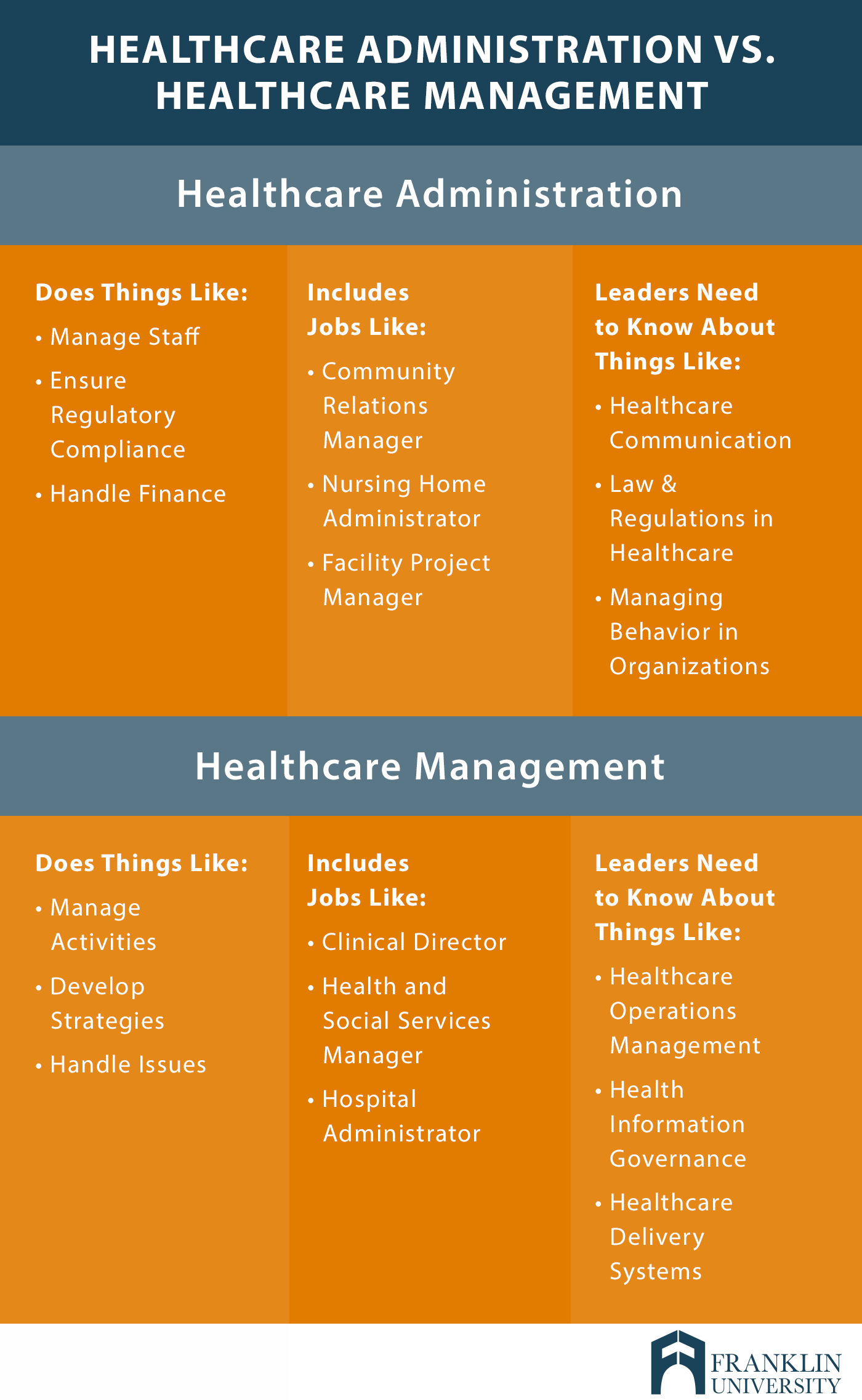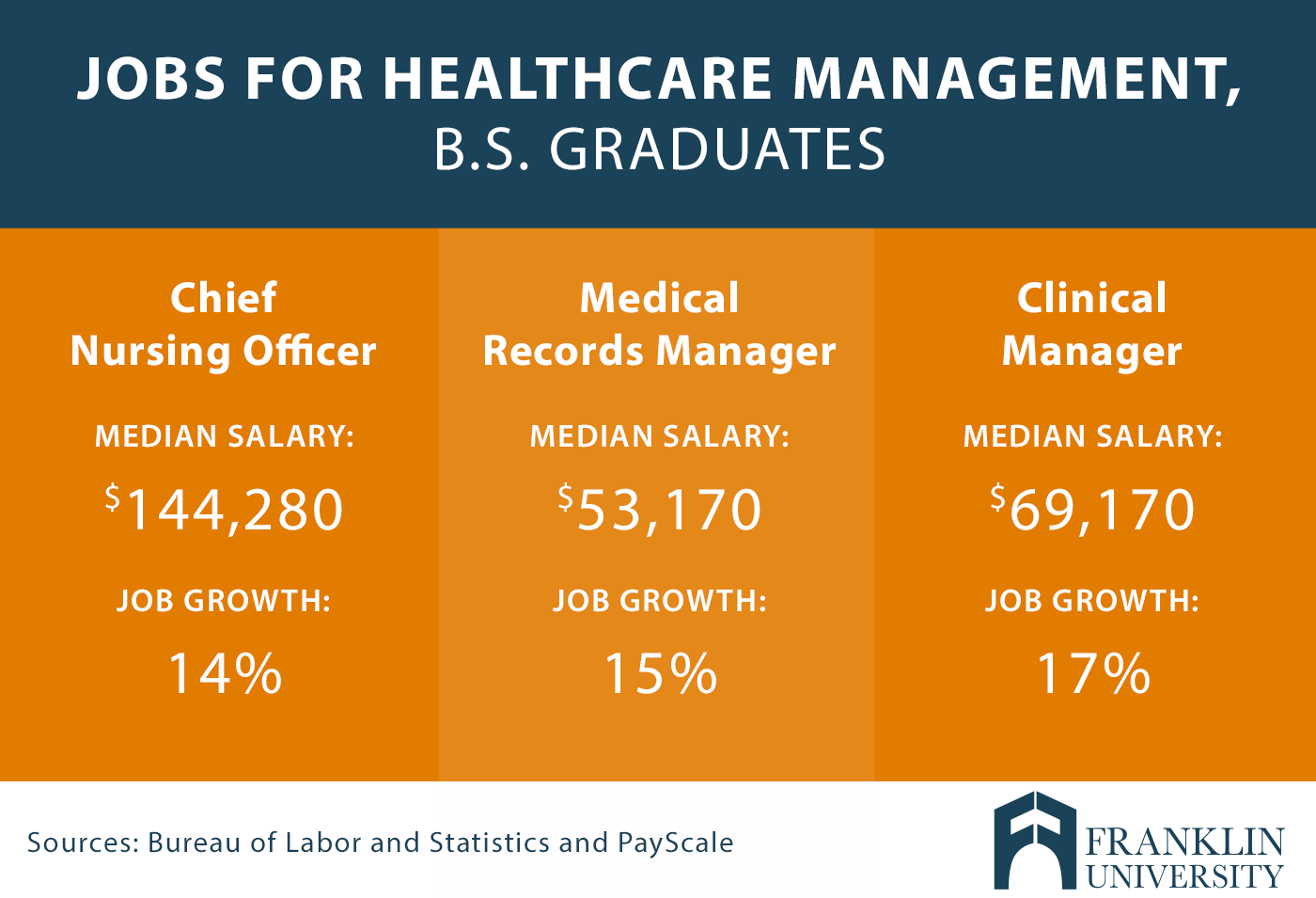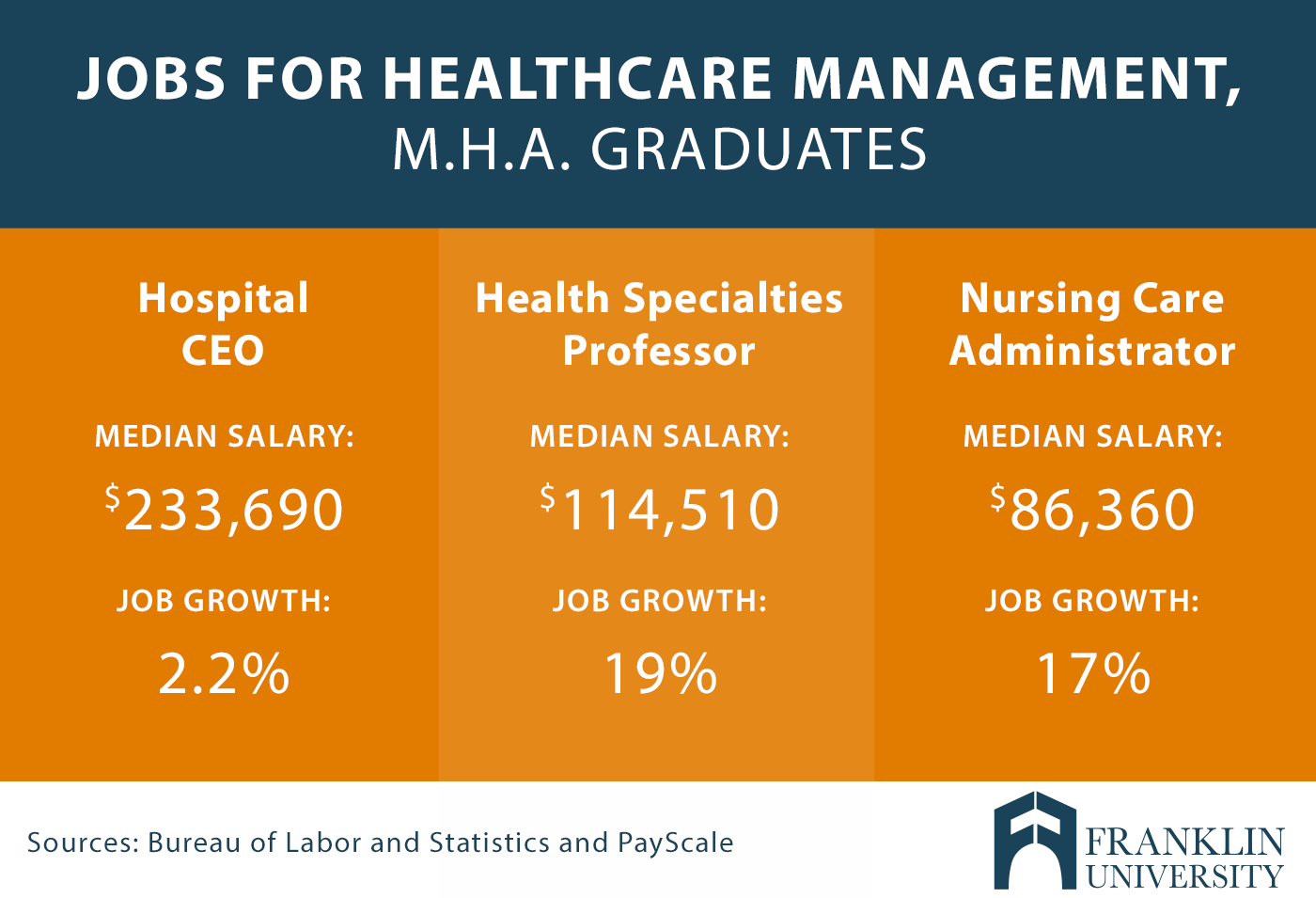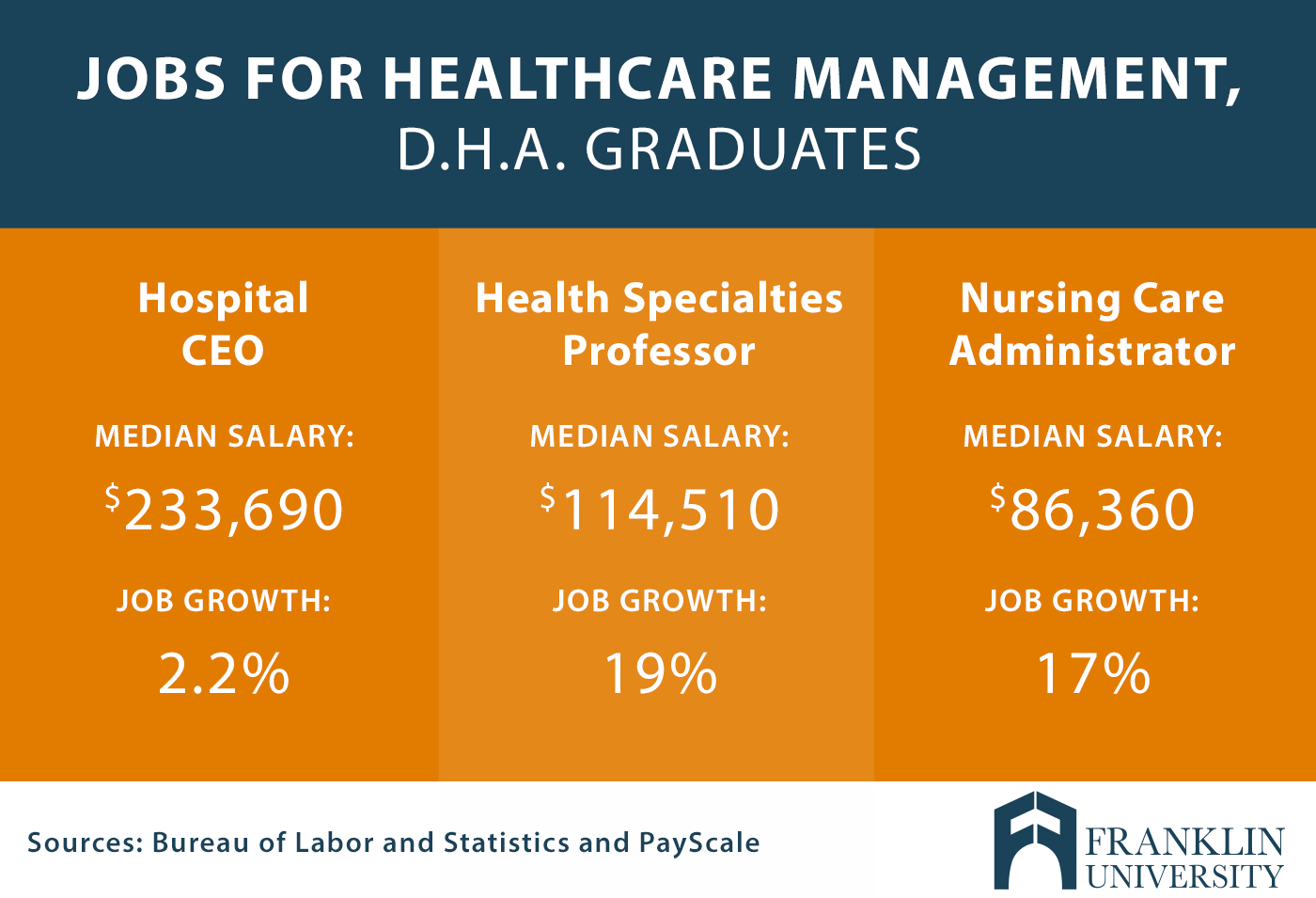Request Information
We're Sorry
There was an unexpected error with the form (your web browser was unable to retrieve some required data from our servers). This kind of error may occur if you have temporarily lost your internet connection. If you're able to verify that your internet connection is stable and the error persists, the Franklin University Help Desk is available to assist you at helpdesk@franklin.edu, 614.947.6682 (local), or 1.866.435.7006 (toll free).
Just a moment while we process your submission.

What Can You Do with a Healthcare Management Degree?
It’s no secret that the healthcare industry is experiencing rapid growth.
According to a 2018 report by The Atlantic, “for the first time in history, healthcare has surpassed manufacturing and retail, the most significant job engines of the 20th century, to become the largest source of jobs in the U.S.”
This explosive growth is a result of both our aging population and our healthcare services becoming increasingly complex. For those with a passion for healthcare and good business acumen, a healthcare management degree is the ticket to a rewarding and secure career path in the health field.
If you’re wondering what exactly healthcare management is (and whether a career in the field is right for you), then keep reading. We’ll break down the two sides of a healthcare management degree—healthcare management and healthcare administration—and then discuss what you can do with a bachelor’s, master’s, and even a doctorate in the field.
Whether you are headed to college for the first time or going back to school to make a mid-career change, pursuing a degree in healthcare management can open up an array of in-demand and high-paying jobs.
Healthcare Administration vs. Healthcare Management
Making sense of health industry terminology can be difficult, especially if you’re just getting into the field. Healthcare administration and healthcare management are two terms that are often used interchangeably, but they each refer to a distinct educational and career path.

A healthcare management degree can involve either one or both paths, depending on the program. Let’s look at each one in detail, along with what skills they entail.
Advance your career in Healthcare Administration while you advance patient care. Download your free career guide.
What is Healthcare Administration?
Healthcare administration focuses on the management of staff within a healthcare department or facility. While there may be some contact with patients, an administrator’s main tasks are overseeing staff, handling finances, and ensuring that all regulations are followed. Most healthcare administration positions require a bachelor's degree in healthcare management or administration—or a business degree with a focus on the medical field.
What is Healthcare Management?
While healthcare administration professionals handle staffing, Healthcare management professionals run the show. Executives at hospitals, clinics, rehabilitation centers and nursing homes are all considered healthcare management positions. These positions generally require an advanced degree, such as an MHA or MBA. Many executive positions will require a DHA (Doctor of Healthcare Administration).
Navigating the operational needs of a healthcare facility and its staff also requires a general understanding of the services and procedures that they offer. Many programs allow you to specialize in areas such as emergency planning and health information. If you have already narrowed your career path, completing specialized coursework while in school is a great way to set your application out from the pack. If you’re keeping your options open, keep in mind that most entry-level jobs in health management will provide on-the-job training so that you can pick up expertise in your area of operation after you’re hired.
Now that you’re familiar with the two main sides of the industry, we’ll break down the different types of degrees you can get and where they can take you.
What Can You Do with a Bachelor’s in Healthcare Management?
There are many different programs that fall under the umbrella of a bachelor’s of healthcare management. Some focus more on administration, while some focus more on management.
Many programs are tailored to specific areas within healthcare, such as informatics or insurance underwriting, while others are designed for students who want a broader education that they can use in a variety of settings. Here’s a breakdown of what you will learn and what types of jobs will be within your reach after graduation.
What You’ll Learn
Healthcare management programs begin by providing you with a strong background in a range of business and healthcare topics, including:
- Principles of Management
- Financial Accounting
- Risk Assessment
- Communication & Leadership
- Healthcare Policy
- Healthcare Delivery Systems
- Healthcare Information Systems
You will then build on this foundation by developing the skills you will need to successfully oversee the day-to-day operation of a medical facility, its staff, and its patients.
Where You’ll Go
An undergraduate degree in healthcare management will prepare you for management roles in hospitals, clinics, long-term care facilities, pharmaceutical companies, and insurance and consulting firms. These include many in-demand, high salary positions. Here is a sampling of occupations that require a bachelor’s in healthcare management.

What Can You Do with a Master’s in Healthcare Administration?
If your goal is to pursue a corporate career path in healthcare, you’re most likely going to need a master’s degree. Mid-career healthcare professionals may consider both an MBA and an MHA to help maximize their earning potential.
An MBA is a good choice if you’re definitely interested in management but are not sure you want to stay in the healthcare field and want to stay flexible. An MHA is heavily focused on business as it relates to healthcare. It generally takes two years to complete as a full-time student and can be the golden ticket to maximizing your earning potential.
What You’ll Learn
MHA coursework focuses on how to balance patient needs with fiscal responsibility. You will take classes in the following areas of focus:
- Healthcare Operations Management
- Laws & Ethics
- Delivery Systems and
- Information Governance.
Some programs offer the option to specialize even further by taking electives such as informatics, data analysis and global health. Many programs, including Franklin University’s online Master’s in Healthcare Administration, offer transfer credits for prior professional experience, credentials and certifications, that make it possible to finish your degree in under two years. Be sure to research these options before deciding on a program.
Where You’ll Go
An MHA opens up many healthcare leadership positions that may not be attainable for someone with only a bachelor’s degree. These positions come with a great level of responsibility, as well as higher median salary. According to PayScale’s College Salary Report, the average annual salary at an entry-level job for MHA graduates is $57,100, compared to just $39,400 for bachelor’s degree holders. Here are a few positions you can pursue with an MHA:

What Can You Do with a Doctorate in Healthcare Administration?
For established healthcare managers and supervisors looking to further advance in the field and make it to the C-suite, a Doctor of Healthcare Administration may be in the cards. A DHA is for those wanting to be the innovative, forward-thinking leaders of the health industry of the future. Programs generally requires 3-5 years of full-time study to complete, and require a dissertation or capstone project at the end.
What You’ll Learn
DHA programs train you to be both an educator and a visionary. The focus is on bringing forth new ideas to improve health practices and patient care. Expect to study topics like:
- Advanced Health Economics
- Healthcare Public Policy
- Strategic Change Management
- Resource Allocation
- Leadership Strategies
Since most programs require a master’s degree and five or more years of experience, you will be surrounded by peers with a wide range of expertise that will add to the learning environment.
Where You’ll Go
A DHA will qualify you to teach public healthcare management and administration—and related subjects—as a professor. As the need for healthcare professionals rises, so will the need for experienced instructors to train the workforce of tomorrow. Here are just a few of the top positions available to DHA graduates:

Prepare for Leadership in Healthcare
As our healthcare needs continue to grow, so will the job market for healthcare professionals that can navigate and facilitate advances in services and care. These are occupations that entail great responsibility alongside high job satisfaction. Whether you decide to work toward a bachelor’s, master’s or doctorate in healthcare management or administration, you will be putting yourself on an accelerated path to a meaningful career in the healthcare industry.





